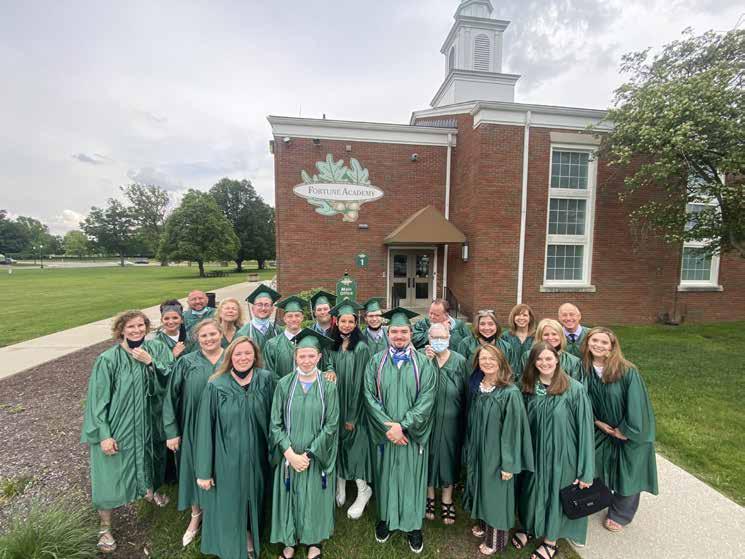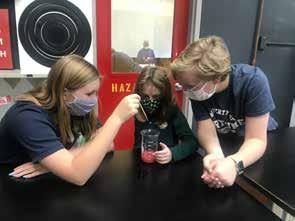
3 minute read
Sponsor of the Month

By Maria Smietana
It may seem obvious, but just as neurotypical children don’t learn all learn the same way, children with special needs don’t either. As research in early childhood education, educational psychology, and neurobiology rapidly advance our understanding of how the human brain learns, teaching methods and educational settings evolve along with the research. That has led to an increased number of specialized schools with smaller student populations and teachers trained to give personalized instruction.
Advertisement

Jake Wolf in class
One such school is Fortune Academy in Indianapolis. Located at the historic Fort Benjamin Harrison, the independent school serves students in grades 1–12 who have language learning differences, according to Marketing and Communications Specialist Lydia Chastain. The mission of Fortune Academy is to be a comprehensive school dedicated to educating and equipping students with language-based learning differences to become competent and confident lifelong learners. “Our school is designed for students with average to above-average potential to learn but have yet to unlock their potential past their learning challenges,” Chastain said. “Our students process information differently than what is expected in a conventional classroom. They need a different approach to learning. Simply remediating them in the same failed methods does not work.”

The term “language learning differences” encompasses a dizzying array of diagnoses, including dyslexia, dyscalculia, dysgraphia, expressive language disorder, receptive language disorder, written expression disorder, and central auditory processing disorder (CAPD). Fortune Academy also serves students with ADD/ADHD and executive function disorder, which often occur with learning disorders.

Data from the National Institute of Child Health and Human Development shows that nearly 1 in 5 students are affected by dyslexia, 1 in 30 have been diagnosed with ADD/ADHD, and over 40% of students with language-based learning differences are improperly placed in special needs programs that aren’t addressing their needs. “We are home to these students,” Chastain emphasized. “They deserve an education that makes sense to them; we are here to provide it.”

How does Fortune Academy do this? “We focus on meeting the students where they are, building on their individual strengths and offering remediation in their areas of weakness,” Chastain said. “We use multi-sensory instruction to support academic learning, and help them improve self-awareness, executive function skills, perseverance skills, and attainable goal setting. We teach and practice effective coping strategies and self-advocacy skills.”

It’s a significant promise, and Fortune Academy has been delivering on it for nearly 20 years. Founded in 2002 by Janet George with a handful of students and dedicated parents, the school moved from its first location on 38th Street to its current building on the Fort Benjamin Harrison grounds in 2012. George stepped down as head of school in 2019 and is now Fortune Academy’s accredited training fellow with the Orton Gillingham Academy. Vanessa Coles became head of school in 2019.
In addition to providing innovative opportunities for the students, teacher training, and an expanding, comprehensive community resource center, Fortune Academy sets itself apart as a leader in research-based education. Currently, it is the only school in Indiana that is accredited by the Academy of Orton-Gillingham. https://www.ortonacademy.org.
The school is also accredited by the Independent Schools Association of the Central States (ISACS) and the International Dyslexia Association (IDA). The Masters in Special Education Guide placed Fortune Academy 18th in its ranking of the nation’s 50 best special needs schools. https://www.thefortuneacademy.org/who-we-are.
Fortune Academy does not qualify for federal or state funding and must rely on tuition, fees, donations, and grant funding for its operating costs as a not-for-profit private school.
“Families come to us from all over the country all wanting the same thing: to simply give their child an education they deserve and the opportunity to succeed,” Chastain said. “Our students thrive in our intentionally small classrooms, with outstanding, trained educators who can give personal, diagnostic, and prescriptive instruction in an environment where students can fully be themselves.
Fortune Academy is a 501C3 non-profit organization. If you are interested in donating to Fortune Academy to help support students with learning differences, please click here.
Admissions Information: www.thefortuneacademy.org 5626 Lawton Loop E Drive | Indianapolis, IN 46216 (317) 377- 0544 – Phone | (317) 845-4285 – Fax
Media inquiries: Lydia Chastain (317) 474 – 7588 Lchastain@thefortuneacademy.org











